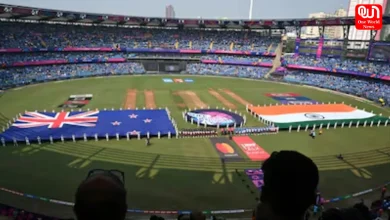Jitesh Sharma Clashes With Umpire in Asia Cup Rising Stars 2025
Jitesh Sharma clashes with umpire after India A’s clean relay catch is denied against Pakistan Shaheens, sparking major controversy in Rising Stars 2025.
Furious Drama Unfolds as Jitesh Sharma Clashes With Umpire Over Denied Relay Catch in Intense India A vs Pakistan Shaheens Match
The India A vs Pakistan Shaheens clash in the Asia Cup Rising Stars 2025 turned heated when skipper Jitesh Sharma clashed with the umpire over a dramatic relay catch decision. What appeared to be a perfectly executed fielding effort turned into a major controversy after the TV umpire declared Maaz Sadaqat not out, despite India A’s confident celebrations. The decision not only shocked the players but also ignited an argument on the field, leaving Jitesh visibly furious.
The Moment That Sparked Outrage
In the 10th over of Pakistan Shaheens’ chase, Maaz Sadaqat—well set at 56—attempted to loft leg-spinner Suyash Sharma over the boundary. Fielder Nehal Wadhera sprinted towards the ropes and showed exceptional athleticism. Realizing his momentum would take him over the boundary, Wadhera smartly tossed the ball back into play before crossing the rope.
Naman Dhir, stationed nearby, completed the catch cleanly, and both fielders celebrated what looked like a brilliant relay dismissal. The Indian camp believed they had removed the dangerous Sadaqat, but the decision rested with the TV umpire.
Read more: Bigg Boss 19 Drama: Kunickaa Sadanand Claims “She Is A Lesbian” About Malti Chahar
Did the Third Umpire Misinterpret ICC’s Updated Rule?
After several replays, third umpire Morshed Ali Khan stunned everyone by ruling Sadaqat not out. This triggered an immediate reaction from Jitesh Sharma, who confronted the on-field umpire, arguing that the fielders had fully complied with the laws. However, the decision remained unchanged, leaving India A frustrated.
What made it even stranger was that the delivery was counted as a dot ball, with umpires awarding neither six runs nor the two runs Sadaqat completed before the relay catch.
Understanding the ICC’s Boundary Catch Rule
In July, the ICC updated its playing conditions under Law 19.5.2, clarifying boundary relay catches. The rule states:
A fielder may jump from outside the boundary to touch the ball if airborne, but once they land, every subsequent contact until the ball is dead must be inside the field of play.
In this incident, Wadhera made only one contact with the ball before crossing the boundary rope. Since he did not touch the ball again after landing outside, the catch technically followed the rule. The controversy arose because he didn’t re-enter the field airborne to continue the relay—something required only if he made a second contact with the ball.
This technicality created confusion and ultimately led to Pakistan Shaheens getting a huge lifeline.
Read more: Rajkummar Rao & Patralekhaa Celebrate Joyous Arrival of Their Baby Girl on Their Anniversary
Sadaqat’s Second Life Turns the Match
With the catch overturned, Sadaqat continued his fluent innings, eventually remaining unbeaten on 79. His composed knock helped Pakistan Shaheens cruise to an eight-wicket victory, securing their place in the tournament’s semi-finals.
For India A, the decision became the turning point. Jitesh Sharma’s visible frustration reflected the team’s disappointment, as they believed the dismissal should have stood based on the fielders’ flawless execution.
A Debate That Will Continue
This incident has reignited discussions around boundary catch interpretations and the consistency of TV umpiring decisions. India A’s relay effort showcased high-level skill, yet the technical nuance of the rule allowed the third umpire to deny the catch. As debates continue online, this moment will likely be remembered as one of the most controversial decisions of the Rising Stars 2025 tournament.
We’re now on WhatsApp. Click to join.
Like this post?
Register at One World News to never miss out on videos, celeb interviews, and best reads.








